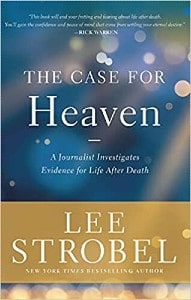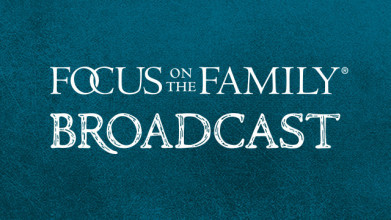Preview:
Lee Strobel: It’s relevant because if Heaven is real, uh, which I believe it is and that’s what my book is about, that Heaven is real. If that is true, it’s like having a vacation on your calendar, and when we know that Heaven is on our future calendar, we may not know when, but when we know some day it’s on our calendar, it helps us deal with the present difficulties, because we say, “As hard as things can get in this world, guess what? I’m going to Heaven.”
End of Preview
John Fuller: Lee Strobel joins us today on Focus on the Family. Thank you for being with us. I’m John Fuller and your host is Focus president and author, Jim Daly.
Jim Daly: John, here’s a question. What’s one thing that you think about in regards to Heaven?
John: Uh, you’re asking me?
Jim: Yeah.
John: Okay, so, uh, freedom. Freedom from sin and pains of life, light. How about sleep?
Jim: (laughs)
John: I think we’re gonna be able to sleep in Heaven. I really hope so.
Jim: Heavenly sleep.
John: Yeah.
Jim: I like that. I think we’ll be so excited we won’t wanna sleep.
John: Okay.
Jim: For at least the first 10,000 years.
John: (laughs)
Jim: Who knows?
John: It’s good.
Jim: I don’t know, but uh, those are good things and it’s nice to think about Heaven.
John: It is.
Jim: That should be part of our daily routine. Lord, we’re looking forward to it because this place isn’t where we wanna be for eternity for sure. And uh, you know, one of the- the great things in the New Testament, Book of Revelation, in fact, chapter 21 verse 4, where the Apostle John describes our encounters with God in the new Heaven and the new earth, he writes, “he will wipe away every tear from their eyes and death shall be no more. Neither shall there be mourning, nor crying, nor pain anymore, for the former things have passed away.”
John: I think that’s pretty awesome.
Lee: That’s wonderful. That’s a favorite voice.
Jim: Right? And I’m looking forward to it, and from time to time, we’ve had folks come in and talk about what they think of Heaven. Randy Alcorn has been here, but I’m so excited to talk with Lee Strobel, our guest today. Lee has, not only an incredibly testimony, but a great intellect and a wonderful demonstration of faith in Christ.
John: Mm-hmm. Yeah, Lee is, uh, a self-described atheist turned Christian. He’s a best-selling author. He’s been on this broadcast a number of times and currently serves as founding director of the Lee Strobel Center for Evangelism and Applied Apologetics at Colorado Christian University.
Jim: I wish I were 24 again.
John: (laughs)
Jim: I’d be at that- I’d be at that program.
John: I’ll bet we could get you up there if you want.
Jim: (laughs)
John: Uh, today we’re gonna be talking about Lee’s book, The Case for Heaven: A Journalist Investigates Evidence for Life After Death. Call us for your copy. 800, the letter A, and the word FAMILY, or stop by focusonthefamily.com/broadcast for details.
Jim: Lee, welcome back.
Lee: Thanks. I appreciate being here. It’s always great to be with you guys.
Jim: It’s so good to have you, and so fun just to talk about the Lord.
Lee: Yeah.
Jim: It’s the joy of the Lord to- to experience that and you bring that every time you’re here, so thank you.
Lee: Aw, thank you.
Jim: I’m not sure your wife would say every day you come home.
Lee: (laughs) Well-
Jim: Maybe, let’s be real.
Lee: (laughs)
Jim: Really, does she always say that?
Lee: We just had our 50th wedding anniversary.
Jim: Congratulations. Wonderful.
Lee: Thank you. So, after 50 years, you know, things um-
Jim: Hey honey.
Lee: Yeah (laughs).
Jim: Let me ask you, uh, some people listening may not know your background, so you wrote an incredible book, a best seller, probably you know, a defining work that you did, and I’m sure everybody, it’s like being a movie star and you’re known as that character. What do they call that in Hollywood when you’re, that’s what you’re stereotyped as? Typecast.
Lee: Typecast, there you go.
Jim: And you probably get a little bit of that, but uh, The Case for Christ.
Lee: Yes.
Jim: And what’s the one minute, two minute version of The Case for Christ, and what- what the Lord did in your heart as an atheist?
Lee: Yeah, I was a atheist. I was a journalist. My background’s in journalism and law, so I was a skeptical type person.
Jim: Boo. A journalist.
Lee: Yeah. I- I-
Jim: Boo.
Lee: Yeah (laughs)
Jim: Man, have they lost street credit.
Lee: Oh my goodness.
Jim: I mean, since you left the profession, it went downhill.
Lee: There you go.
Jim: But hit it.
Lee: I mean, I don’t know what to say, but um, yeah, I lived a very immoral life. A drunken, profane, narcissistic life.
Jim: Mm.
Lee: Because I figured, if there is no God, if there is no Heaven, if there is no Hell, if there is no judgment, if there is no ultimate accountability, then the most logical way to for me to live my life, uh, would be as a hedonist, someone who would just pursue pleasure, so that’s what I did. Uh, my wife was agnostic, didn’t know what to think about God. She met a woman who was a Christian and a nurse. They became best friends, took her to church, answered her questions, and then Leslie came up to me one day and he gave me the worst news an atheist husband can get. She said, “I’ve decided to become a follower of Jesus.”
Jim: (laughs) Oh.
Lee: And I thought, oh no, here it comes. I mean, I was gonna walk out.
Jim: Yeah?
Lee: I was gonna divorce her.
Jim: There was a movie made actually.
Lee: Yes.
Jim: What’s the title of that movie?
Lee: It’s The Case for Christ. It came out in 2017.
Jim: Yeah, it’s really good. Where can somebody see that?
Lee: They can find it online.
Jim: Okay, great.
Lee: Yeah, it’s still available. So, uh, she became a follower of Christ, and I thought, if I used my journalism training and legal training, I could certainly disprove the linchpin of Christianity, which is the resurrection of Jesus and rescue her from this cult that she’s gotten involved in.
Jim: Right.
Lee: And so, I spent two years of my life using my journalism training and legal training to investigate historically, the evidence for and against the resurrection of Jesus, until November the 8th of 1981 when I realized, in light of the av- avalanche of evidence that points so powerfully toward the truth of Christianity, it would’ve taken more faith to maintain my atheism than to become a Christian.
Jim: Well, you know, so often, we in the Christian community almost, and I’m guilty of this-
Lee: Yeah.
Jim: I flippantly will say that.
Lee: Yeah.
Jim: Man, it takes more faith for you when I’m talking, especially to an atheist-
Lee: Right.
Jim: … agnostic, antagonist.
Lee: Yeah.
Jim: And- and they’ll look at me like I’m crazy, and, but it’s true.
Lee: It is true. You look at the resurrection. We’ve got, you know, was Jesus dead? Even the journal of the American Medical Association says he was clearly dead after being crucified. Um, you know, we have an early account of his resurrection, including named eyewitnesses and groups of eyewitnesses, that’s been dated back to within months of his death, too early to be a legend. We have an empty tomb that even the opponents of Jesus admitted was empty, and we have nine ancient sources inside and outside the New Testament, confirming and corroborating the conviction of the disciples that they encountered the resurrected Jesus.
Jim: Mm.
Lee: So, we’ve got an avalanche of historical data.
Jim: Let- let’s move into the story.
Lee: Yeah.
Jim: The Case for Heaven. This can be really abstract for people.
Lee: Yeah.
Jim: I mean, we, I was talking to our volunteer group here at Focus.
Lee: Mm-hmm.
Jim: Many of them are over 65, 70.
Lee: Yeah.
Jim: One of them had passed away, one of our older volunteers, and you know, there was the right, uh, mourning of that, and the sadness of not having him here-
Lee: Sure.
Jim: … but I got up and addressed him and said, “Isn’t that awesome?”
Lee: Yeah.
Jim: I mean, isn’t… he’s there.
Lee: Yeah.
Jim: It’s, this is incredible.
Lee: Yeah.
Jim: And some of them responded to that. Others were kinda looking at me like, what?
Lee: Yeah.
Jim: (laughs) But the joy of that transition.
Lee: Yeah.
Jim: I’m looking forward to it.
Lee: Well, you know, I’ll tell you when it hit me. Uh, I was um, on my deathbed. Um, my wife found me unconscious. She called an ambulance. I woke up in the emergency room. I looked up into the face of the emergency room doctor and he said, “You’re one step away from a coma, two steps away from dying.” And then I fell unconscious again.
Jim: Huh.
John: Hm.
Lee: So, I had an unusual medical condition called Hyponatremia, which is a severe drop in blood sodium, so I lingered between life and death for several days until they were able to save my life.
Jim: How long ago was this?
Lee: This was 12 years ago.
Jim: Wow.
Lee: And so, when that happens, when you have a brush with death like that, and you don’t know, am I gonna close my eyes and open them in the next world? You don’t know. This becomes very relevant. (laughs) You know? All of a sudden, the idea of Heaven is not some ephemeral, uh, you know, vague kind of idea that you think about maybe once in a while. It becomes the dominant thought in your mind. And so, I thought, you know, I believe based on the Bible as a Christian what happens when we die, but I’m also a skeptic, you know?
Jim: You got it in your blood.
Lee: (laughs) I got it.
Jim: Your heart.
Lee: It’s in my DNA. I got-
Jim: Yeah.
Lee: So, that’s what launched me on this two year investigation to investigate the evidence for the afterlife.
Jim: Hmm.
Lee: And what I found was, that science and, uh, his- history and all these other disciplines support what the Bible tells us about the afterlife, and, but so, the- the metaphor I- I love the most is Jesus, uh, when he used the metaphor of home.
Jim: Mm.
Lee: You know, he says, “There are many rooms in my father’s home,” and I- I thought about the fact that, you know, I don’t know if you’ve ever been in a third world country, maybe in difficult conditions. I remember after I became a Christian, I went to India to share my faith.
Jim: Yeah.
Lee: And I’m living out of a knapsack, sleeping on the ground, and eating strange foods and life was difficult and primitive, and- and you- you begin to develop this homesickness, this desire for home, and then when you finally get home, and you walk in the front door, and you climb into your own bed, it is such a place of comfort and warmth and love and grace, and Jesus is saying, “That’s the image-
Jim: Yeah.
Lee: … I want you to remember. That is your home. Heaven is your real home.” So when you think of home, think of Heaven. Uh, and- and that just makes me-
Jim: That’s great. I love it.
Lee: Gives a sense of anticipation.
Jim: Yeah, especially if you’ve done something like that, a mission trip or something.
Lee: Right.
Jim: I mean, I- I- I believe that’s the creation of the ugly American because we’re so spoiled in-
Lee: Yes.
Jim: … what the Lord has blessed us with, our comfortable beds-
Lee: Yeah.
Jim: … our comfortable homes-
Lee: Yeah.
Jim: … our heaters, our everything, and then you go and experience something like that-
Lee: Right.
Jim: … sleeping on the street that you know, much of this world does.
Lee: Yeah, exactly.
Jim: And it should give you deep appreciation.
Lee: Yeah.
Jim: Uh, let’s get even deeper into it.
Lee: Yeah.
Jim: In the book, you talk about, and this is what I love about you (laughs), Lee, is just that interview idea. You- you- you’re the reporter-
Lee: (laughs)
Jim: … on the beat. So, you’re going out to talk to some of the world’s best stories.
Lee: Yeah.
Jim: People that have experienced amazing things. Clay Jones jumps out.
Lee: Yeah.
Jim: So, tell us about Clay Jones. What did he share with you that caught your attention?
Lee: Well, Clay Jones, fascinating guy. He, when he was younger, um, thought he was dying. He was diagnosed with a serious form of cancer, um, and had to cope with that and deal with that until finally, it was discovered that this was not a variant form of cancer and that he was gonna survive, so it was kind of an- an answer to prayer there, that he would survive, but he’s also always wondered about this fear of death-
Jim: Which he had.
Lee: … which he had, and you know, he wrote a book called Immortal, which is about the fear of death. We all have it to some degree. In fact, uh, Hebrews two, verse, uh, 15 says many people become slaves to the fear of death.
Jim: Hm.
Lee: Even King David feared death, um, and the Ecclesiastics tells us that eternity was planted in our heart, so there’s something in us that wants to live forever, and that we fear this idea of dying prematurely and so forth. How many times do we go to a funeral and we don’t say it, but in the back of our minds we’re thinking, poor ole Uncle Tom. You know, he died, but I’m glad it’s never gonna happen to me.
Jim: Yeah, it’s like, tick-tock, tick-tock.
Lee: Yes.
Jim: It’s coming.
Lee: It’s coming.
Jim: But we don’t like to acknowledge that. I’m with you.
Lee: And- and so, I- I think there’s a lot of ways that people try to live on without God.
Jim: Now, let me ask you that question. Maybe someone who does know the Lord is watching on YouTube or listening, and they may be refuting this a little bit.
Lee: Mm.
Jim: Why- why generally, do all people, people of faith, too, but people without faith, fear death?
Lee: Yeah.
Jim: What is that fearness if- if it’s all organic-
Lee: Exactly.
Jim: Let’s go to the agnostic or the atheist side. If you know it’s gonna happen and it’s scientific and it’s all neurochemistry, and you know, who cares?
Lee: Right.
Jim: Why do you fear it?
Lee: Right, you know, when I was an atheist, I thought that when I died, it was like the refrigerator going out, uh, the light going out in the refrigerator when you close the door. Boom, it just goes out. That’s it.
John: Does it?
Lee: (laughs) No. Yeah, does it really? Good question. There’s a skeptic for you. But um, so I think people try to soft pedal it and say, “Oh, it’s just gonna be like, uh, you know, you didn’t exist for thousands of years, then you existed for a short period of time, now you’re just gonna not exist again, so it’s no big deal.” Uh, but that’s just ways that people are trying to mitigate it and make it seem like it’s more palatable than it really is. We have a, and in a fear of death, and the only cure for it, according to the Bible, according to Hebrews, is Jesus.
Jim: (laughs) Yeah.
Lee: A robust view of Jesus who offers us hope, who offers us eternal life, who offers us Heaven. That’s our real hope.
John: Well, we’re talking about big things and real things on today’s episode of Focus on the Family with Jim Daly. Lee Strobel is our guest, and uh, there’s so much in his book, The Case for Heaven: A Journalist Investigates Evidence for Life After Death. Uh, get a copy. Uh, there’s so much more in there than we can get to today. Our number is 800, the letter A, and the word FAMILY. 800-232-6459 or stop by focusonthefamily.com/broadcast.
Jim: Lee, you have another, what sounded like a sad story, Ralph Lewis. What- what can we learn and what did you intend for us to learn putting his story in the book?
Lee: Yeah, here’s a case of someone whose, um, family went through a health crisis, uh, and really through whatever you wanna call it, providence or whatever, found recovery, and yet, decided that, you know what? I just don’t believe that, uh, there’s a God and I don’t believe that there is a consciousness, that we’re just computers. We’re just, uh, neurons and brains that- that flash and so forth, and there’s no real human consciousness involved. So- so I think there’s a lot of scientists, uh, who come to the conclusion that we are just our brain. Uh, we have no consciousness. Uh, we have no soul. Um, and so, I went a PhD and neuroscience from Cambridge University, Dr. Sharon Dirckx, who wrote a book called, Am I Just My Brain? And the conclusion of that book is, no, you’re not just your brain. You have a soul as well. We are a body and we are a soul, or a consciousness, and uh, that explains a lot when we think in those terms, but a lot of people who atheists and skeptics can’t accept that because they’re materialists. They believe only in that which we can tough, and so they say, “Well, we must just be our brains.” No. There’s something immaterial that is a consciousness, the- the seed of our volition and our emotions and our identity, is in our consciousness, and so why is that important? It’s important because, uh, the Apostle Paul said, “To be absent from the body is to be present with the Lord.” Jesus told the repentant criminal on the cross, “Today, you’ll be with me in paradise.” That means there’s really two, uh, phases to Heaven. The first phase is called the immediate Heaven or the intermediate state. That’s when we die and our soul separates from our body and continues to live on, either in the presence of the Lord or separated from him in Hades. Um, the second phase comes at the end of history, when Jesus returns, when we are reunited with our resurrected bodies, when we go through final judgment, and then we spend eternity in a very physical Heaven or a very physical Hell.
Jim: Yeah.
Lee: So, for that to be true, we must have a consciousness that survives our clinical death. And uh, so I did a lot of research in that area, uh, to try to determine, can we have confidence that when we die, our soul continues to live on?
Jim: Let me ask you this question, uh, related to the Cambridge professor.
Lee: Yes.
Jim: Um, when you’re, I believe it’s fair to say, there’s a growing cohort of physicians who are now moving in this direction-
Lee: Yes.
Jim: That there is something beyond the material.
Lee: Yes.
Jim: And it- it- it’s rather exciting once again, where science is actually catching up-
Lee: Right.
Jim: … to scripture.
Lee: Right.
Jim: That’s always good, but I also appreciate the openness of psychologists and others who are skeptics-
Lee: Mm-hmm.
Jim: … like you used to be.
Lee: Sure.
Jim: Who are saying, “Now, there is something here.”
Lee: Yeah.
Jim: And they now have studies that show that people that pray-
Lee: Mm-hmm.
Jim: … when they’re in a medical crisis, and when people pray for them around their bed-
Lee: Yeah.
Jim: … that there is a measurable benefit to them.
Lee: Yes.
Jim: And they can’t ignore it.
Lee: Yes.
Jim: I think that’s a great indication for us as Christians and hopefully, a stepping off place for the atheist to say, okay, maybe I need to think more deeply about this, that science is proving that God is real.
Lee: Yes, and you know, you look at what she did, uh, this pro- this uh, doctor of neurosurgery and- and neuroscience, when she would investigate the brain, she would see regions of the brain light up when certain thoughts took place, but those aren’t the thoughts. They’re correlated to the thoughts. In other words, you can’t open a cell and say, “Oh, there’s Jim Daly.” No. Um, our consciousness, our identity, our soul is distinct from our physical brain, and yet, interacts with our physical brain. Uh, one of the ways we know is, um, uh, try to describe the aroma of coffee.
Jim: Right. It’s impossible.
Lee: You can’t- you can’t do it. I mean, you could describe the chemical makeup of caffeine. You could describe, um, how coffee is grown and how your body processes it, but that doesn’t get you close to what it really smells like. You have to experience it, and that’s what the consciousness does. It is the- the seed of our experience. If there were a woman named Mary, who knew, uh, was a scientist and knew everything about the human eye, how it functions, how the optic nerve works, uh, all the details about the, but she was blind, what happens if all of a sudden, she received her eyesight? Would she learn anything new about vision?
Jim: Yeah.
Lee: Well, of course she would. Because now she would experience vision. That’s why you can’t reduce our- our experience to just the physical neurons of the brain.
Jim: And it makes sense.
Lee: It does.
Jim: It really does. Uh, she also went on to tell you a story about a woman who had a near death experience.
Lee: Yes.
Jim: What was that story about?
Lee: Pamela Reynolds.
Jim: Yeah.
Lee: One of the most documented experiences. Now, Jim, I was a skeptic about near death experiences.
Jim: Yeah.
Lee: Um, I, but I learned that there are 900 scholarly studies done in medical and scientific journals over the last 40 years on near death experiences. This is a very well-studied area, and Pamela Reynolds’ case is well studied. Pamela Reynolds was a 35 year old housewife from Atlanta, Georgia. She had a brain aneurism. She had to undergo a very unusual operation. So, they take her in, they put her under deep anesthetic. They taped her eyes shut. They put earplugs in her ears that had the equivalent of 100 decibels of noise, which is the equivalent of a subway train going right next to you. Then, they taped those earplugs into her ears, and then they put tape and gauge all over her ears, so she couldn’t hear. She’s put under deep anesthetic. They begin to saw into her head to do the brain surgery. She says later, “That’s when my spirit, my consciousness, separated from my body,” and she said, “I was watching, um, the entire surgery from outside my body.” She was able to identify what the saw looked like. She was even able to tell us what the, um, how the different blades of the saw were kept in a certain kind of container.
Jim: Mm.
Lee: She was even able to identify what one nurse said to another nurse. One nurse said, “Her- her, we have a problem. Her arteries are too small,” and the other nurse said, “Try the other leg.” How could she have heard that? How could she have seen this?
Jim: Right.
Lee: And then, get this. Her body is cooled to 60 degrees, her heart is stopped, the bed is tilted, and every drop of blood is drained from her head. She has zero brainwaves, she has zero heartbeat. She is clinically dead, and yet, this is the point at which she said, “No, no, no. I was fully alive.” And she describes going like, in an elevator. She describes meeting dead relatives, having conversations with them, um, very elaborate things that happened to her during this time that she was physically dead. Um, then she describes coming back and saying, “I didn’t wanna get back into my body. It looked like it was hit by a train.” I mean, my goodness
Jim: Yeah, right (laughs).
Lee: You know, and then finally, she did get reunited with her body and she was revived. Um, how do you explain those things, uh, if they weren’t really an out of body experience? And so, in my book, I document numerous cases, where people either see things or hear things during a near death experience that would be impossible to see or hear, unless they really did separate, their consciousness separate from their body.
Jim: And I’m so, again, so impressed, that you as a skeptic, come at it with that kind of degree of, eh, prove it to me.
Lee: Yeah.
Jim: And one of your good friends is John Burke.
Lee: Right.
Jim: Whose, we’ve had on the broadcast. He’s become a friend of mine as well.
Lee: Yep.
Jim: And he’s done a lot in this area of- of researching and interviewing.
Lee: Right.
Jim: He told me the other day, I think it was 1800 now.
Lee: Yeah.
Jim: Interviews that he’s done, 1800, 1900 of near death experience people that are clinically dead, and he- he, that’s a very specific requirement.
Lee: Right.
Jim: That you are determined to have no brainwave and no heartbeat. You’re clinically dead.
Lee: And one of the things that John has determined, and this was a breakthrough. John is a Christian pastor as well of a church in Austin, Texas, and he determined that when you look at the commonality of what happens to these near death experiences, you don’t look at how people interpret it-
Jim: Correct.
Lee: … because people interpret things according to their world view.
Jim: Yeah.
Lee: Look at what actually takes place. It is consistent with Christian theology.
Jim: Yeah.
Lee: That is a real breakthrough, that kind of research, and so, you know, I don’t- I don’t build my theology based on near death experiences, but it does confirm and corroborate the Bible selling us the truth, when it says, “We have his soul, and that it continues to live on after our physical demise.”
Jim: And I- I do love that. He says, I- I ask the subject-
Lee: Yeah.
Jim: … just to tell me what they experience, not the interpretation of what they experience.
Lee: Yes.
Jim: And that’s great.
Lee: Yeah.
Jim: This is what I saw. And then all those commonalities line up.
Lee: Exactly.
Jim: That’s another great book, Imagine Heaven.
Lee: Yes.
Jim: Uh, tell us about Ian McCormack. Uh, what was his story and how did it relate in his near death experience?
Lee: Yeah, Ian was, uh, stung multiple times by box jellyfish, probably the most poisonous animal on the planet.
Jim: Mm.
Lee: And was about to die. Uh, there’s no way you survive that, but he did somehow, and in the midst of it, he, uh, had a vision of his mother who always told him, “Call out to Jesus if you’re in trouble,” and he called out to Jesus, Jesus rescued him from that situation, and again, we see this in several different cases of people who have, some of them have a hellish experience, in which they’ve called out to Jesus and been rescued.
Jim: Mention that one because that was my next question.
Lee: Yeah, Howard Storm.
Jim: Yeah.
Lee: Howard Storm was a art professor and chairmen of the art department of a secular university. He was an atheist, he was in the hospital, he was dying, and- and uh, was beckoned by, what turned out to be demons. Uh, he went with them, his- his uh, consciousness accompanied them, and they assaulted him. He said, “I was reduced to roadkill.” He said, “No horror movie could ever capture how cruel they were to me, and in the midst of it, I called out to Jesus and this ball of light came, and Jesus rescued me,” and this was so radical to him, this is so real to him that when he finally recovered, he not only renounces Atheism, he not only resigned his tenured position at the university, but he went to seminary, got his degree, and became, not just a Christian, but a pastor of a- of a small little church in the Midwest.
Jim: I mean, that- that should be evidence.
Lee: Yeah, exactly. This was not just a dream. Somebody’s told me, “Oh, he had a dream.” No, no, no.
Jim: That’s a changed life.
Lee: That’s a changed life. Nobody has a dream and changes life like that, and uh, he’ll tell you that, it did not have the characteristics of a dream.
Jim: You know, in so many ways, uh, we tend to, I think, complicate what we read in scripture. Like, you know, these are the apostles.
Lee: Yep.
Jim: The big letter A. They were supernatural people. They weren’t. They were like us.
Lee: Right.
Jim: Exactly like us, and so you, I kind of, uh, compare that experience of this man-
Lee: Yeah.
Jim: … who had this experience and became a committed Christian to like, Paul.
Lee: Yeah.
Jim: I mean, Paul had this blinding light-
Lee: Yeah, that’s right.
Jim: Who said, “Why are you persecuting me, Paul? I’m Jesus, the one you persecuted.”
Lee: Yeah.
Jim: And then, the spirit told him, you know, to stay there, and then the Lord spoke to another man-
Lee: Yeah.
Jim: Ananias, to come and speak to Paul. Of course, Ananias is like, “What?”
Lee: Yeah.
Jim: “He’s killing Christians, Lord.”
Lee: Right, exactly.
Jim: “Why do you want me to go talk to him?”
Lee: Yes.
Jim: I love that realness of, are you serious?
Lee: Yeah.
Jim: And then he goes and speaks to him, and boom, Paul becomes a prolific contributor-
Lee: Yeah.
Jim: Obviously, and leader in the faith.
Lee: And this is not unusual in these near death experiences, to have that kind of radical 180 degree life change. About 24 percent of cases are negative. They’re hellish experiences.
Jim: Yeah, I guess, and- and I talked to John about that-
Lee: Yeah.
Jim: And he said, “You know, what’s interesting is, those people become Christians at a much faster rate-
Lee: Oh yeah.
Jim: … than the middle ground people.”
Lee: Oh yeah.
Jim: Like, they are convinced.
Lee: Yeah.
Jim: You know, they had that experience.
Lee: Yeah.
Jim: Also with John, and this is a good place for us to end here, uh, for today. We’re gonna come back next time if you’re willing.
Lee: Yeah, sure.
Jim: We’ll feed you lunch.
Lee: (laughs)
Jim: But come back and keep the discussion going, but you had a good discussion with John when he told you that his goal behind sharing these stories is much deeper. What- what did John share with you?
Lee: You know what’s interesting. John, like me, is a very nuts and boltsy kind of person.
Jim: He’s an engineer.
Lee: He’s an engineer.
Jim: Yep.
Lee: So, he thinks in terms of logic and reason, and I asked him, “What’s your motive in doing this? What do you wanna do?” And he started to cry.
Jim: Hm.
Lee: He got tears in his eyes, he said, “I just want people to know, there’s hope, there’s redemption, there’s eternal life, there’s- there’s- there’s a life beyond this, that we can know it, that we can experience it with Jesus forever, and he- he just, he has no other goal, as I have no other goal, other than to see people come into a life changing and eternity altering experience with Jesus Christ, and to spend eternity with him in Heaven.
Jim: Yeah, Lee, this has been so good. I, you can probably see, I get excited about this topic.
Lee: (laughs)
Jim: I mean, I love it.
Lee: That’s ’cause you’re like me, you’re getting older (laughs).
Jim: Yeah, I mean, it’s getting closer.
Lee: Right.
Jim: No, but I just think, man, I- I struggle with somebody who can’t open their eyes-
Lee: Yeah.
Jim: … to see the evidence in front of them, and even, I just wish everybody could have an experience like both you and John Burke have had, to sit with somebody, or many somebody’s-
Lee: Yeah.
Jim: … who have experienced these things, you can’t walk away unchanged. You shouldn’t-
Lee: Right.
Jim: … walk away unchanged, and you know, through the power of media, we get to do this through YouTube and you know, 2,000 radio stations and go global, and I so appreciate you being with us.
Lee: Thanks.
Jim: So people can taste-
Lee: Yeah.
Jim: … what you’re saying, and I love your book. You’ve, we can’t cover it at all, but-
Lee: Sure.
Jim: The Case for Heaven. You should get the book. (laughs) I mean, man, why not? And uh, learn more about where you’re headed? I mean, who takes a journey and doesn’t look to see what to do in New York?
Lee: (laughs)
Jim: Right? This book will give you an idea about what you’re gonna experience and what is likely in, uh, your relationship with Christ. So get ahold of us, make it simple, make a gift of any amount, and we’ll send you the book to say, thank you. If you can do that monthly, it’s great. We help people every day. Literally, hundreds of thousands of people will be helped this year with Focus on the Family. Be a part of it. Uh, be on the team. And if you can’t, being a Christian ministry, we’ll get it into your hands. If you can’t afford that, we get that. I mean, some people are under some stress financially, let us bless you by giving you the book, and we’ll trust others will cover the cost of that. The point is, get the book, change your life.
John: Mm. Yeah, contact us today. Our number is 800, the letter A, and the word FAMILY. 800-232-6459. Uh, all the details for getting a copy of The Case for Heaven, and if you’re in a spot to do so, to donate to the ministry, or at focusonthefamily.com/broadcast. And on behalf of Jim Daly and the entire team, thanks for joining us today for Focus on the Family. I’m John Fuller inviting you back as we continue the conversation with Lee and once again, help you and your family thrive in Christ.





















